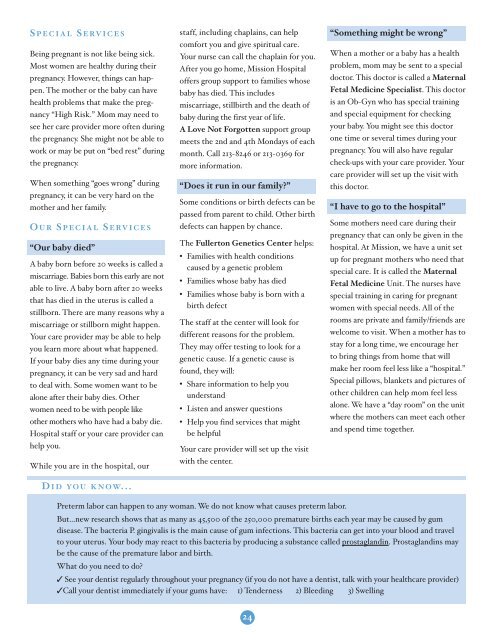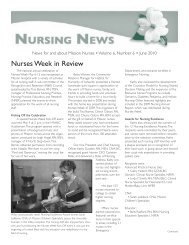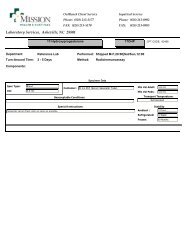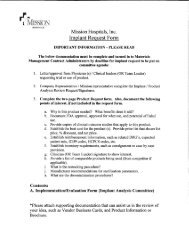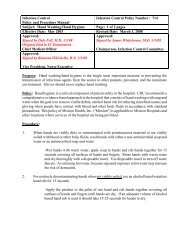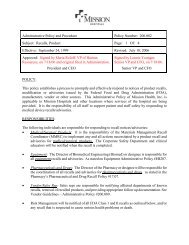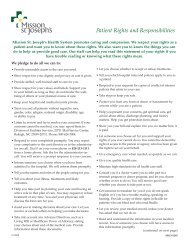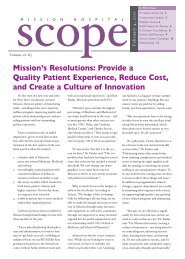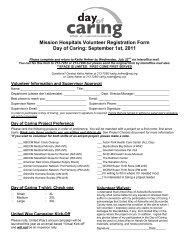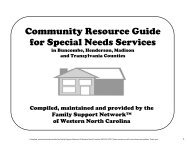New Beginnings: Pregnancy Guides - Mission Health
New Beginnings: Pregnancy Guides - Mission Health
New Beginnings: Pregnancy Guides - Mission Health
You also want an ePaper? Increase the reach of your titles
YUMPU automatically turns print PDFs into web optimized ePapers that Google loves.
S PECIAL S ERVICES<br />
Being pregnant is not like being sick.<br />
Most women are healthy during their<br />
pregnancy. However, things can happen.<br />
The mother or the baby can have<br />
health problems that make the pregnancy<br />
“High Risk.” Mom may need to<br />
see her care provider more often during<br />
the pregnancy. She might not be able to<br />
work or may be put on “bed rest” during<br />
the pregnancy.<br />
When something “goes wrong” during<br />
pregnancy, it can be very hard on the<br />
mother and her family.<br />
O UR S PECIAL S ERVICES<br />
“Our baby died”<br />
A baby born before 20 weeks is called a<br />
miscarriage. Babies born this early are not<br />
able to live. A baby born after 20 weeks<br />
that has died in the uterus is called a<br />
stillborn. There are many reasons why a<br />
miscarriage or stillborn might happen.<br />
Your care provider may be able to help<br />
you learn more about what happened.<br />
If your baby dies any time during your<br />
pregnancy, it can be very sad and hard<br />
to deal with. Some women want to be<br />
alone after their baby dies. Other<br />
women need to be with people like<br />
other mothers who have had a baby die.<br />
Hospital staff or your care provider can<br />
help you.<br />
While you are in the hospital, our<br />
D ID YOU KNOW...<br />
staff, including chaplains, can help<br />
comfort you and give spiritual care.<br />
Your nurse can call the chaplain for you.<br />
After you go home, <strong>Mission</strong> Hospital<br />
offers group support to families whose<br />
baby has died. This includes<br />
miscarriage, stillbirth and the death of<br />
baby during the first year of life.<br />
A Love Not Forgotten support group<br />
meets the 2nd and 4th Mondays of each<br />
month. Call 213-8246 or 213-0369 for<br />
more information.<br />
“Does it run in our family”<br />
Some conditions or birth defects can be<br />
passed from parent to child. Other birth<br />
defects can happen by chance.<br />
The Fullerton Genetics Center helps:<br />
• Families with health conditions<br />
caused by a genetic problem<br />
• Families whose baby has died<br />
• Families whose baby is born with a<br />
birth defect<br />
The staff at the center will look for<br />
different reasons for the problem.<br />
They may offer testing to look for a<br />
genetic cause. If a genetic cause is<br />
found, they will:<br />
• Share information to help you<br />
understand<br />
• Listen and answer questions<br />
• Help you find services that might<br />
be helpful<br />
Your care provider will set up the visit<br />
with the center.<br />
“Something might be wrong”<br />
When a mother or a baby has a health<br />
problem, mom may be sent to a special<br />
doctor. This doctor is called a Maternal<br />
Fetal Medicine Specialist. This doctor<br />
is an Ob-Gyn who has special training<br />
and special equipment for checking<br />
your baby. You might see this doctor<br />
one time or several times during your<br />
pregnancy. You will also have regular<br />
check-ups with your care provider. Your<br />
care provider will set up the visit with<br />
this doctor.<br />
“I have to go to the hospital”<br />
Some mothers need care during their<br />
pregnancy that can only be given in the<br />
hospital. At <strong>Mission</strong>, we have a unit set<br />
up for pregnant mothers who need that<br />
special care. It is called the Maternal<br />
Fetal Medicine Unit. The nurses have<br />
special training in caring for pregnant<br />
women with special needs. All of the<br />
rooms are private and family/friends are<br />
welcome to visit. When a mother has to<br />
stay for a long time, we encourage her<br />
to bring things from home that will<br />
make her room feel less like a “hospital.”<br />
Special pillows, blankets and pictures of<br />
other children can help mom feel less<br />
alone. We have a “day room” on the unit<br />
where the mothers can meet each other<br />
and spend time together.<br />
Preterm labor can happen to any woman. We do not know what causes preterm labor.<br />
But...new research shows that as many as 45,500 of the 250,000 premature births each year may be caused by gum<br />
disease. The bacteria P. gingivalis is the main cause of gum infections. This bacteria can get into your blood and travel<br />
to your uterus. Your body may react to this bacteria by producing a substance called prostaglandin. Prostaglandins may<br />
be the cause of the premature labor and birth.<br />
What do you need to do<br />
✓ See your dentist regularly throughout your pregnancy (if you do not have a dentist, talk with your healthcare provider)<br />
✓Call your dentist immediately if your gums have: 1) Tenderness 2) Bleeding 3) Swelling<br />
24


